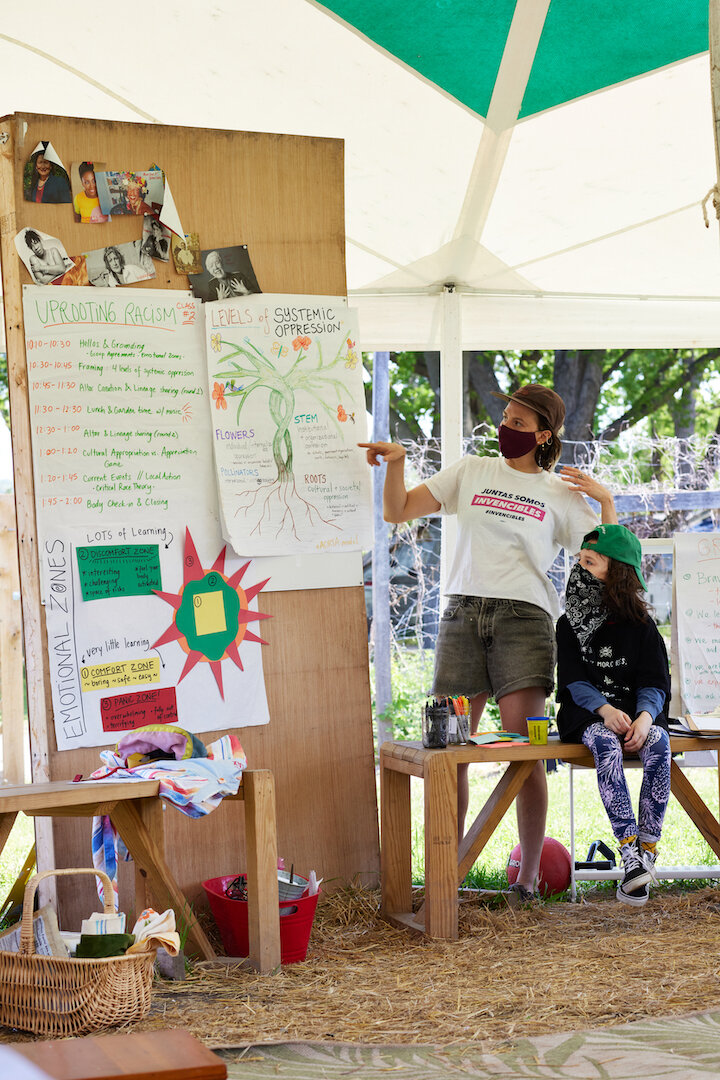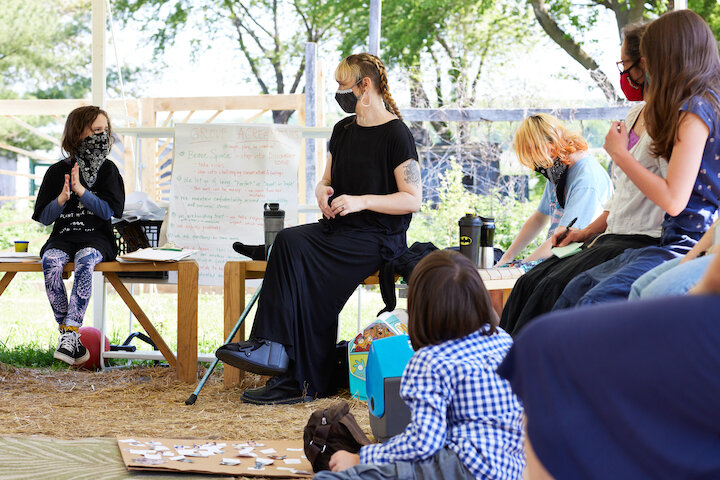COSMOS CANVAS
Tuesdays, 10am - 2pm | Ages 8 - 14 | April - June 2021
Astronomy, art, and actively exploring our celestial selves—with Rebecca Posner and scrap wrenn.
In this class we explored the mechanics, patterns, relationships, and designs of the universe, engaging in creative investigations of the moon, planets, stars, and more.
We began by developing our astronomical vocabularies, learning terms like solar, lunar, solstice, equinox, axis, constellation and others.
We learned about the phases of the moon, engaging with the concept of rotation and orbit both at large in the cosmos and within the observable relationships of the sun, earth, and moon. We built and drew our own mandelas with concentric circles to both visualize the forces and motions that shape the solar system and illustrate the terms we had learned.
In our outdoor classroom we traveled to different research stations to learn about the planets, and then we turned our eyes upwards, studying the planets and stars visible in the night sky. At home, students practiced locating North, South, East and West; recorded observations of the sky and its changes over time; and practiced noticing planets and constellations.
We dove into the history of ancient astronomy observations, following the path of discovery from geocentricity to heliocentricity and making our own telescopes. And students conducted research about lesser-known astronomers throughout history, including female and female-identifying scientists who have contributed to our knowledge of the universe: Sophia Brahe, Wang Zhenyi, Enheduanna, Aglaonice, Maria Cunitz, Jeanne Dumée, Marie-Jeanne de Lalande, Hypatia, Al-ʻIjliyyah, Maria Mitchell, and others.
We explored the life cycle of the stars, making maps of the sky, and creating planispheres (or star wheels) to help us locate constellations. As stargazers at home, students created their own constellations and constellation myths, making visual connections between the stars and imagining the stories they tell.
We examined calendar and time-keeping systems according to the planets, discovering different calendar and holiday cycles and the relationship between astrology and astronomy. Together we learned about the axes and orbits of other planets to imagine seasons in outer space, and then students used both astronomical and mythological information to imagine a calendar, time-keeping system, and rituals for another planet.
We discussed questions of scale: considering the idea of galactic scale, astronomical distance, and the implications of traveling near to the speed of light. We made circular calendars and mobiles to creatively imagining cosmological structures in balance, and looked at two videos to introduce vast scale as it relates to physics and math: the Eames studio classic "Powers of Ten” and this video for imagining an interstellar voyage. At home students imagined their own deep space adventure, creating graphic stories to tell stories of an imagined voyage light years away, and the learnings and challenges they face along the way.
We imagined what it might be like to live as an astronaut on the International Space Station, taking on specific missions and job: Pilot, Researcher, Engineer. Whatever their role and specialty, astronauts keep journals to chronicle their missions; inspired by real journals, students wrote and drew journal entries about their imagined life as an astronaut. What would it be like to live without gravity - to exercise, communicate, rest, sleep, connect, and take care?
We also learned about exoplanets - distant planets orbiting other stars, beyond our own solar system. Only a handful of these exoplanets could be considered "habitable worlds," so as a class we imagined new inventions that could help humans survive and thrive in unfamiliar environments beyond our solar system. We imagined into otherworldly life on an exoplanet, exploring the elements of “liveability” on a planet, and creating tactile posters to illustrate our fantasies of life-supporting alien ecosystems.
RISING UP! PERORMANCE FOR THE PEOPLE
Tuesdays, 9:30pm - 3:00pm | Ages 8 - 14 | September - December 2019
Staging a revolution: understanding social movements through political arts and theater—with Heylan Tsumagari and Rebecca Posner.
Have you ever believed in something so strongly that you would stand up, speak out, or fight for it? For every story of oppression and injustice in history, there is another story of the struggle for freedom. We explored movements for historic and ongoing movements for liberation, through performance, poetry, visual art, printmaking, puppetry, and our very own Rising Up - Performance for the People Troupe.
We began by exploring some foundational concepts and key terms, building on existing knowledge and making new connections. We discussed words like oppression, privilege, power, justice, racism, sexism, classism, social movement, solidarity, intersectionality and others, to guide and ground us in learning about social movements. We then dove into deeper some key fights, focusing on movements for gender equality, abolition, anti-capitalism, and decolonization
We learned about historical movements for gender equality, creating a performance piece in which we connected with our ancestors and elders in the long and ongoing work of feminist movements, and writing poems to envision a world of gender equality.
We learned about the history of movements for abolition, from slave rebellions and the fight for emancipation to today’s movement to defund the police and abolish prisons. We watched the film 13th by Ava Duvarney and made visual art to deepen our understanding: students each created a roving art and performance pieces to share Fannie Lou Hammer’s message: “Nobody is Free Until We Are All Free.”
We learned about the Land Back Movement (landback.org) and Manifesto, creating images and messaging to express solidarity with Indigeenous land sovereignty movements. We carved our images into linoleum and printed them on shirts, representing themes of allyship, resistance, and decolonization.
Inspired by the work of Bread & Puppet Theater, we used puppetry to learn about the global anti-capitalism movement. Together we asked questions like: What is capitalism? What is the 99%? What/who defines wealth? We connected these questions to consumption in our own lives, listening to the spoken word pieces Are My Hands Clean? and conducting research about current events related to wealth inequality. Then we developed our own puppets, to share and perform stories about capitalism and anti-capitalism.
UPROOTING RACISM
Monthly on Fridays, April - October 2021 | 10am-2pm |
Ages 8-17 plus adult family members
An anti-racist learning journey for white youth and adult family members—with Briggin Scharf and Andrea Mitchell































































